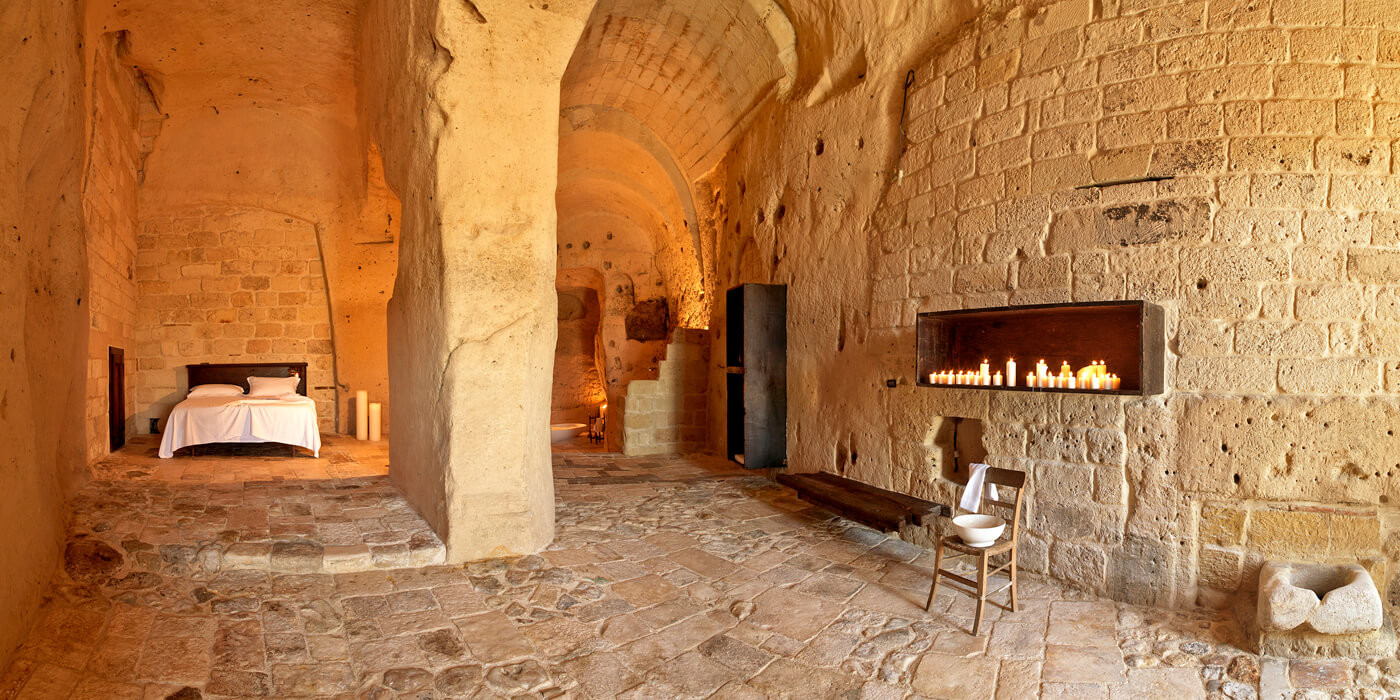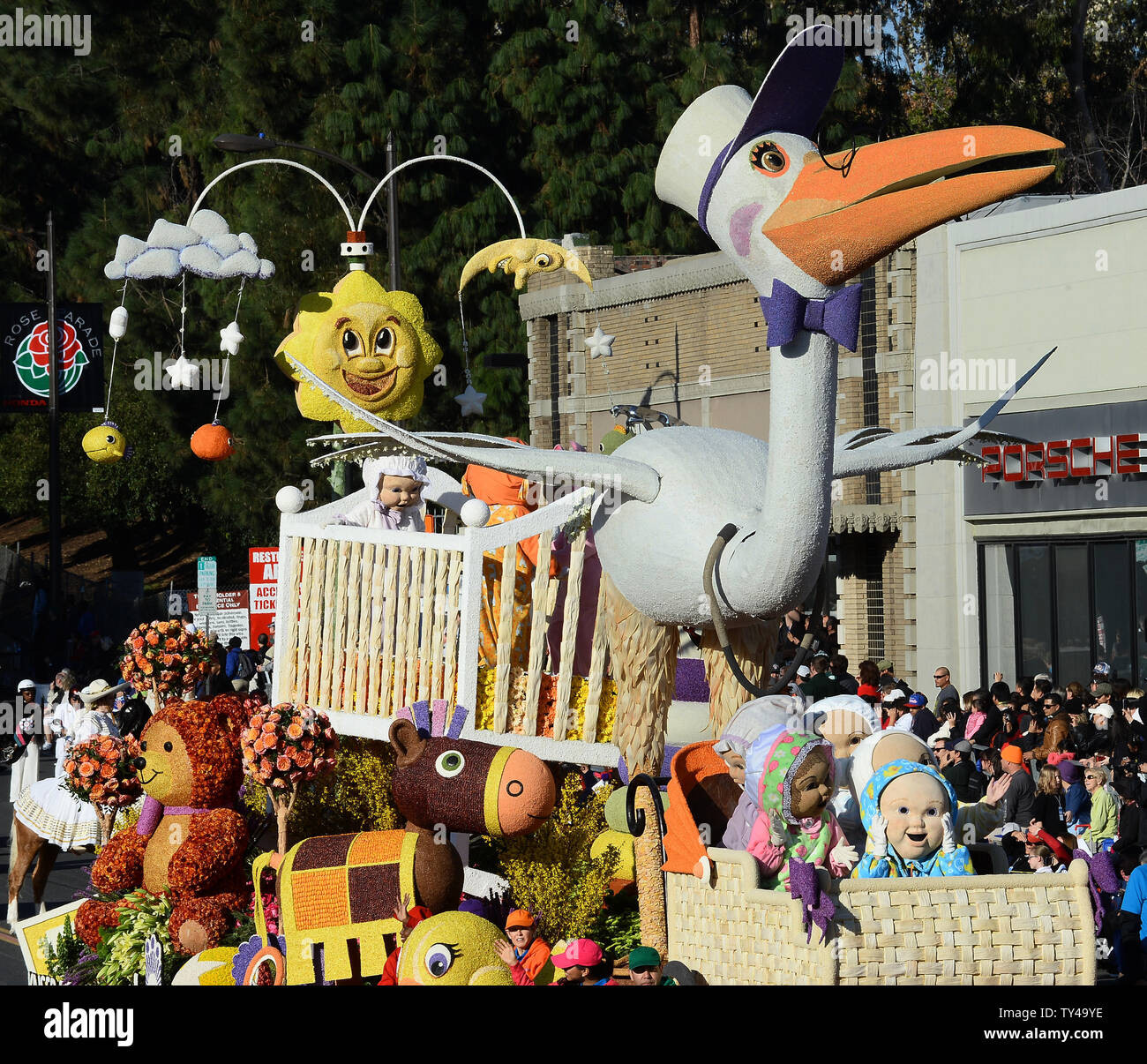One Night In: Sextantio Le Grotte della Civita, Matera, Italy
Evidence of human settlements in Matera’s natural caves, known as the Sassi, trace back to the Paleolithic era. Though it wasn’t all that long ago that the prehistoric caverns served as homes for many thousands of the city’s residents, with rock-hewn churches and cemeteries mixed in among the calcarenite houses. In 1945, Italian activist Carlo Levi wrote about the appalling, deprived living conditions in the overcrowded Sassi, earning Matera’s cave complexes the nickname la vergogna nazionale (“the shame of the nation”)—and its citizens an eviction notice. In 1950, Italy’s prime minister instituted an ill-conceived plan to relocate the Sassi’s entire population to new housing developments outside the city, and the abandoned cave networks went into disrepair. But after a slew of restoration and preservation efforts in the 1980s, and a 1993 UNESCO World Heritage Site designation, the first cave hotels started to open in Matera, with renovation oversight by conservation experts. In the decades since, the same caves that were once the locus of Italian shame have played a major role in the city’s tourism boom and economic prosperity.
Sextantio Le Grotte della Civita is located in the oldest part of the prehistoric cave-dwelling districts of Matera, Italy, known as the Sassi.
A Journey Through Time
8 a.m.: My family and I are on the road to Matera after grabbing a cappuccino and croissant at a cafe called Almond. We’ve been in Italy for three days already and are anxious for a change of scenery from the lush Puglian countryside to the rocky Basilicata region. We are exhausted. Miles of windmills dot the landscape to our right. We try to identify where the line of them ends, but every time we think we’ve seen the last, another spinning needle reveals itself in the distance. We argue about the Italian word for cow. I nod in and out of sleep.
10:30 a.m.: We arrive in what we will soon understand to be “new” Matera—the part of the city erected after the Italian government’s 1950 mandate to evacuate the Sassi. There is a narrow green space between two main roads where cyclists skirt traffic and old men sit on benches. This is where the parking garage that Sextantio has directed us to leave our car and wait for the pickup shuttle is located. I press my forehead against the window to try and catch a glimpse of the Matera I’ve seen in pictures, a honeycomb of sand-colored rock structures clustered in a jagged heap, but wherever it is, it’s blocked by a series of plaster facades.
We pack into the pickup van with a couple who has just flown in from Florida. I ask how they decided on Sextantio; the woman replies that they “wanted to do the cave thing.” I get my first peek at the old city as we zigzag through streets that raise caution for a vehicle of our size. After about 10 minutes, we arrive.
A Unique Blend of History and Luxury
The albergo diffuso (“scattered hotel”) comprises 18 guest rooms in restored natural caverns, as well as a common space with a dining area in a rupestrian church.
11 a.m.: A robot with two conveyor belts for legs and a crate for luggage carries our bags up several stone steps to the reception area. (Historic sites and 21st-century luxuries can coexist.) The hotel has no “lobby” per se, only a large outdoor space with rustic furniture—Sextantio’s own piazza. When I arrive, a woman sips a cappuccino at a table with a lone bench that looks out onto Alta Murgia National Park opposite the hotel. I step inside a chamber on the piazza marked “Reception.”
My first impression from inside one of Matera’s cave dwellings, aside from the 30-second period of blindness I experience while my eyes adjust to the lack of sun, is how lovely it smells in the calcarenite room. I look around to find the source and spot wooden diffusers in a wall divot. Scentless candles light up many of the cave’s natural nooks. Classical music echoes off the high ceilings. I walk past another guest and she recommends I take the hotel’s weaving class. I lament that I will not have the time.
Exploring Matera
11:30 a.m: My family and I decide to explore the city and find lunch while we wait for our rooms to be prepared. As we trundle up the stairs toward a level street, we pass a group of German tourists who have stopped at a nearby lookout. I hear the guide refer to Sextantio by name and take note that our hotel merits mention. Considering the 18 guest rooms are individual caves carved into a singular rock face, it is not entirely clear where the hotel grounds begin and end. A small public walkway veins through the cluster of accommodations, while small metal gates distinguish each as its own property. (Later, while donning a robe and slippers, I’ll wave to a pair of tourists peering over said gate, perhaps wondering if my room is a gift shop.)
The hotel rooms are carved into the calcarenite (limestone) rock.
2 p.m.: We have sandwiches outside a restaurant where Bruno Mars plays on repeat. An errant rock falls from a nearby roof and a gaggle of policemen caution us to move tables. I receive a text saying that our room is ready and we head back to the hotel. On the way to our room, we’re shown inside the rupestrian church turned hotel dining room, as well as a monastery chapel recently discovered on the property and left untouched—a peek into the dark, rough-walled caves of yore.
Our room is a little less of yore, but not without it. Sextantio’s accommodations offer modern comforts like porcelain bathtubs and plush mattresses, but most of the furniture is sourced from the original caves. Ours has one king bed and two twins, all rudimentary wooden bed frames with slim metal legs. The rocky floors feel textured under my bare feet as I unpack my luggage. I accidentally brush against one of the unadorned stone walls and leave a small trail of sediment in my wake.
Then, I settle into one of the beds for what will be one of the deepest naps of my life. The rest of my family follows suit.
Immersed in History
2:50 p.m.: We are jolted awake by my phone’s alarm and clamber outside for our scheduled walking tour in a hazy delirium. Somehow, we make it on time. One of our stops is a small cave church where an older man dressed in traditional clothing plays a song for us on a putipù, a friction drum typical to the region. He shares that he was born in Matera before the cave settlements were evacuated, and this is the church he frequented as a child.
6 p.m.: After a long tour up, down, and around Matera’s sinuous streets, we remember that the hotel offers an aperitivo until 7. Persuaded by the prospect of an Aperol spritz and charcuterie board, we head downstairs to the piazza. Our taglieri arrives as an aesthetic array of local meats and cheeses decorated with prunes, dates, and two different types of jams. In addition to our spritzes, we order a fennel tea—an unexpected crowd favorite. Already full, we head to a restaurant for dinner, and then, stuffed, to a gelateria for dessert.
Each of the cave dwellings maintains its original shape.
A Farewell to Matera
8 a.m.: I open our heavy wooden shutters to a spectacular view of the Murgia across the canyon. I can make out the sound of clanging cowbells from the mucche grazing in the nearby valley. Birds fly at our window level, the city high enough to match their gliding altitude. We start to pack our bags for 11 a.m. checkout.
9 a.m.: The hotel breakfast is served buffet-style. This is not, however, your typical waffle-machine continental. Cured meats and fresh cheeses fill one table; an array of savory and sweet breads on another. There’s also a (largely neglected) basket of hard-boiled eggs. We take our plates and sit outside. A waitress named Vita comes to our table to take our drink orders: quattro cappuccini, per piacere.
When Vita returns with our coffees, we strike a conversation and discover that she has been working at the hotel for over a decade. She teaches the weaving class that I heard about from the other guest at check-in. It’s a shame we won’t be able to take the class, I tell her. Vita tsks her tongue, asks us to wait where we are, and disappears. She returns holding a key. “Let’s go,” she says, motioning us up the stairs toward the cavern that houses the loom. On the way, I sidestep the luggage robot. It’s being loaded with a new bundle of carry-ons from a fresh group of guests ready to “do the cave thing.”
This experience in Matera was more than just a hotel stay; it was a journey through time. The Sassi, with its ancient caves and centuries-old history, offers a unique and unforgettable experience. The hospitality of the locals, the breathtaking views, and the opportunity to learn about the city's past are just a few of the things that make Matera a must-visit destination. And while it might not be for everyone, staying at a cave hotel like Sextantio Le Grotte della Civita is a chance to immerse yourself in a truly special place and create memories that will last a lifetime. Whether you are a history buff, a culture enthusiast, or simply looking for a unique travel experience, a night in a Matera cave hotel is an experience you won't soon forget.

















